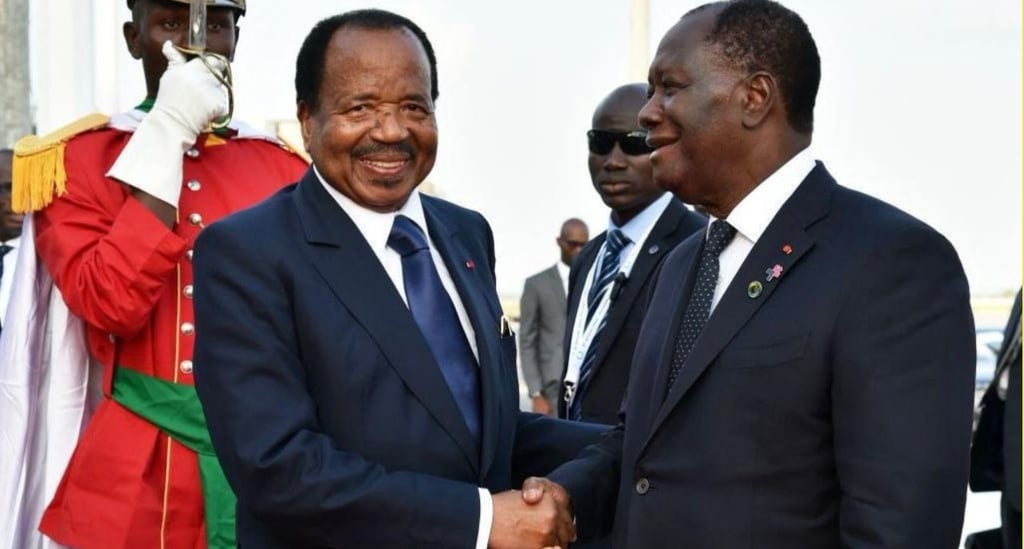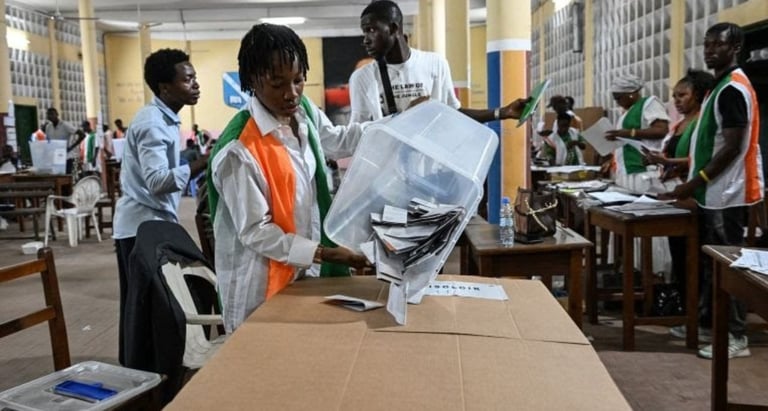The Twin Coronations of Alassane Ouattara and Paul Biya
In Abidjan and Yaoundé, the ballots are counted like blessings each one confirming what everyone already knows. Alassane Ouattara and Paul Biya do not run for office anymore; they ascend to it. Theirs are not elections but coronations, performed beneath the fading banners of democracy, witnessed by citizens who have learned to mistake endurance for peace.
OP-ED
E. N. Quenti
10/26/20254 min read


In Abidjan and Yaoundé, the drums of democracy are beating but the sound is strangely hollow.
Two presidents, two cities, two countries bound by the same weary ritual: the coronation of men who no longer need to campaign, because the crown has long since fused with their skulls.
In Ivory Coast, Alassane Ouattara 83 years old, immaculate in his dark suit and calm smile moves toward a fourth term in office. In Cameroon, Paul Biya 92, remote, spectral, the world’s oldest sitting president prepares once again to ascend the same throne he has occupied for over four decades.
They call them elections, but the language deceives. What is unfolding in these two countries is not democracy, but liturgy: a performance of legitimacy, repeated every few years to remind the faithful that power, like grace, descends from above.
The Ritual of Power
At Notre-Dame College in Abidjan, the counting of ballots felt less like civic duty than religious ceremony. Election officials hunched over wooden tables, their fingers brushing through stacks of paper that had already decided their destiny. Outside, the city watched in silence not expectant, merely obedient.
The atmosphere had the stillness of a mass whose ending everyone already knows. The candidates who might have broken the spell Laurent Gbagbo, Tidjane Thiam were conveniently barred, their exclusions explained in the soft, bureaucratic language of law.
All that remained was the procession: voters filing in, journalists taking notes, soldiers keeping watch, and the same man emerging at dawn to claim victory.
In Yaoundé, the choreography is older, perfected. Paul Biya no longer needs to appear often in public; his absence has become part of his power. When he does emerge, it is to the quiet awe reserved for monarchs and myths. His face, printed on banners, watches from every intersection not as a campaign image, but as a reminder.
The crown never leaves his head; it only grows heavier with time.
The Empire That Never Left
It would be comforting to call this merely a domestic affair, but the pattern runs deeper. Across the old French territories of Africa, the script repeats: Chad, Congo-Brazzaville, Gabon, Ivory Coast, Cameroon. The names change, but the system remains the same a postcolonial dynasty built on the illusion of renewal.
The French called it Françafrique, that subtle network of loyalties and levers that kept the colonies obedient long after the tricolore came down. Paris backed the strongmen who promised “stability” which often meant predictability and in return, those strongmen learned the art of ruling forever while pretending to consult their people.
Today, that empire has frayed. France’s soldiers are leaving, its currency is under question, its influence contested by China, Russia, and local movements that no longer speak French with reverence. Yet its ghost lingers, visible in every coronation that calls itself an election.
In these countries, power does not transfer; it circulates among families, allies, protégés, the trusted few. And so, the ceremony repeats, like an inherited prayer said long after belief has faded.
The People Beneath the Crown
To understand why so many tolerate this repetition, one must remember the fear.
Ivory Coast has not forgotten 2010 the war, the chaos, the bodies in the streets after a disputed vote. Stability, even when hollow, feels safer than blood.
Cameroon’s citizens have learned to live in the shadow of conflict too from the Anglophone crisis to the quiet suffocation of dissent. For them, peace is not prosperity; it is simply the absence of noise.
So when Ouattara speaks of continuity, and Biya of calm, many listen with weary gratitude. They remember what happens when the music stops.
But beneath that gratitude lies fatigue the slow erosion of faith that anything will ever change. The youth in both countries, restless and connected to the wider world through their screens, see the coronations for what they are: a pageant of power without purpose.
They no longer ask for kings to be kind; they ask for kings to end.
A Future Waiting Its Turn
In the quiet streets of Abidjan, as ballots are counted, the night hums with the same electric unease that fills Yaoundé before Biya’s next declaration. Two old men, two nations, one weary continent all bound by the same ritual.
No one doubts who will win. The question, instead, is how long the people will keep pretending this is victory.
Every coronation carries its own contradiction. It celebrates permanence in a world that is dying for renewal. It blesses leaders with legitimacy even as the ground beneath them erodes. And it tells citizens those millions who still line up to vote that their participation matters, even when their power does not.
In that sense, Ouattara and Biya are not just presidents; they are symbols of an era refusing to end. They stand at the twilight of the postcolonial project, men who mistook endurance for destiny.
But history, unlike power, does not stand still. The generation now coming of age across Africa was born under these same faces, but it will not die under them. The crowns may glitter for a while longer, but every coronation, however triumphant, carries the faint sound of a requiem.
And so, in Abidjan and Yaoundé alike, the question lingers in the night air:
How many times can a man be crowned before the people remember that the crown was theirs to begin with?





